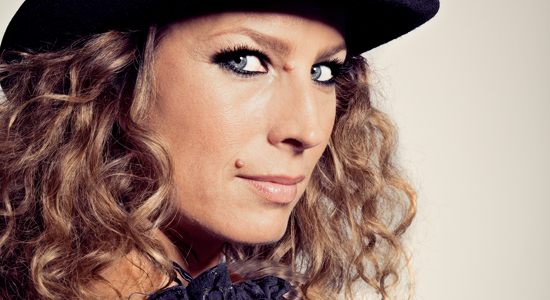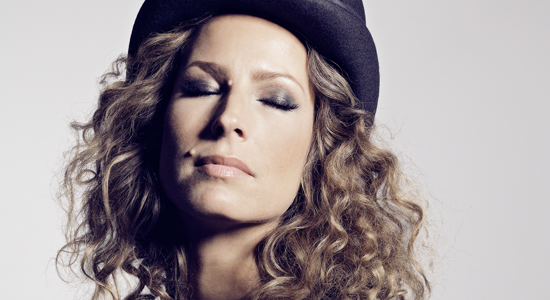
Più di vent’anni passati dietro la consolle con il solo scopo di regalare emozioni. Senza aspettarsi per forza qualcosa in cambio. Basta anche un breve messaggio che ti dice: “Thank you for the music”. Perchè la musica ti rende felice e condividere musica vuol dire disseminare felicità. Detto questo, Monika sembra avere ancora molto da dare ai suoi fan. Dopo Change of Perception, uscito nel 2008 sulla Terminal M, Monika arriva al suo quarto album: Traces. Un altro successo assicurato. Beccatevi la sua intervista per Soundwall.
Ciao Monika! Siamo molto entusiasti di averti qui su Soundwall, visto che sei tra i dj e producer tedeschi di maggior successo. Grazie davvero. É passato molto tempo dalla tua prima performance come dj, nel 1991 al Ultrashall di Monaco. Adesso ti esibisci regolarmente nei club più famosi del mondo, come Barghain, Watergate e Weekend. Cosa è cambiato nel mondo della musica elettronica?
Ci sono stati molti cambiamenti che hanno riguardato gli stili musicali. Ma il cambiamento principale riguarda le apparecchiature e la strumentazione. Prima si utilizzavano solo i vinili, poi i vinili con le drum machines e, alla fine, è iniziato il download degli mp3 e si è arrivati all’utilizzo del computer per realizzare un dj set. Quello che però trovo veramente disgustoso è che qualcuno di questi djs commerciali – non mi riferisco ai djs della nostra scena underground – non mixa neanche più: è già tutto registrato e non fanno proprio niente dal vivo. Ci sono certi video su Youtube che sono davvero incredibili.
Visto che hai passato più di vent’anni a suonare in giro per il mondo, non solo in Europa ma anche in posti come Giappone, Brasile e Australia, qual è tra questi paesi il più promettente per la scena elettronica?
Non saprei. In un paese, o in determinate zone, un dj può avere un grande numero di fan e magari in un altro paese non è così famoso. E poi ogni viene lanciato un nome nuovo. Non so dirti niente sugli altri paesi adesso.
In più di vent’anni vissuti da dj e producer, hai raccolto ricordi e momenti speciali. Poi hai deciso di mettere tutte queste tracce di vita nel tuo ultimo album. Sembra che ti piaccia davvero condividere emozioni. É questo il vero significato di Traces?
‘Traces’ è un modo per esprimere le influenze personali e musicali che ho raccolto nel corso degli anni. È una combinazione dei differenti stili dei musica elettronica che hanno avuto un grande impatto su di me. Agli inizi della mia carriera da dj, sono partita con deep e vocal house. Uno dei miei più grandi idoli è Robert Owens. Questo è anche il motivo per cui ho voluto collaborare con lui nell’ultimo album. Gli ho scritto e fortunatamente a lui è piaciuta l’idea. Così gli ho mandato un loop e lui ci ha cantato sopra: “One Love” è senza dubbio una delle tracce che preferisco dell’intero album. Inoltre, ci sono naturalmente un pò di tracce tech-house per il dancefloor – che è lo stile che più mi identifica al momento – oltre a qualche pezzo downtempo e l’ultima traccia decisamente breakbeat. Ho messo tutto insieme in un mix perché dovrebbe dare l’impressione di un viaggio che attraversa diversi stati mentali. Questo sono le mie tracce!
Ascoltando Traces, non ho potuto fare a meno di innamorarmi di Namaste. Traccia splendida e con un titolo un pò particolare. C’è una storia dietro questa traccia? Cosa puoi dirci?
Ti ringrazio per quello che dici! È sempre difficile per me parlare delle tracce. Una volta Frank Zappa ha detto: “Parlare di musica è come ballare di architettura”. Quando ho iniziato a lavorare in studio, ero appena tornata a casa dalle mie vacanze in Sri Lanka, dove ogni giorno facevo yoga e meditazione. Ritengo che quello stato mentale, la calma, l’essere in viaggio, le emozioni abbiano influenzato molto la traccia. Namaste vuol dire: grazie, ti auguro salute e una vita felice. Ce lo dicevamo sempre dopo una seduta di yoga.
Vorrei chiederti se hai un artista preferito ma non vorrei essere indiscreto. Quindi mi limito a domandarti qual è l’ultimo live a cui hai assistito. E se ti è piaciuto ovviamente.
Il mio artista preferito è Prince. Ha un gran talento musicale, riesce a suonare molti strumenti e inoltre supporta molti nuovi artisti. Ho assistito complessivamente a 10 dei suoi concerti ma l’ultimo show mi ha veramente deluso a dire il vero. Ma siamo esseri umani, a volte falliamo a volte riusciamo.
Monika, il Time Warp arriva in Italia il prossimo settembre e tu sei nella line-up. Cosa ti aspetti da questo fantastico party?
Sono una grande fan del Time Warp. Ho suonato quasi ogni anno nell’edizione tedesca ed è il mio festival indoor preferito. Per noi artisti, è una cosa davvero speciale suonare al Time Warp. Anche se ci sono migliaia di persone, si ha la sensazione di qualcosa di intimo perché facciamo parte della stessa famiglia. Molti rimangono fino alla fine e poi balliamo tutti insieme.
English Version:

She has spent more than 20 years performing as a dj with the only purpose of giving emotions. Without necessarily expecting anything in return, except a little appreciation. Maybe a short message: “Thank you for the music”. Just because she loves spreading happiness by playing music. We’re talking about Monika Kruse, one of the most popular German techno dj and producer. After Change of Perception, released in 2008 on Terminal M, now it’s time for Monika’s 4th album, Traces. Surely a successful album. Now you’re going to enjoy her interview.
Hi Monika! We’re so excited to have one of Germany’s most successful dj and music producer. Thank you for being here on Soundwall. A lot of time has gone by since you started performing as a dj at the Ultrashall Club in Munich. Now you regularly play at most world-famous clubs such as Berghain, Watergate and Weekend. What did really change in the world of electronic music?
There are a lot of changes in the styles of music. But the main change is the electronic gear, I mean it used to be only vinyl, than vinyl with drummaschines, and than all the download mp3 thing started plus using computers for a dj mix. But what I really found disgusting is that some of these commercial djs – I am not talking about our underground djs – not even mix anymore, everything is already recorded and they don’t do it live. There are some videos you can see on you tube which are unbelievable.
Since you’ve been performing for over 20 years around the world, which is the rising star amongst countries like Japan, Australia and Brazil?
I don’t know. Every country or even inside the country areas where a Dj has big fanbase and maybe in another country he is not that famous and every year there is a new hype, so I cannot tell you anything about the other countries now.
In more than 20 years as a dj and music producer, you have collected memories and special moments. Then you have put all of these “traces” of life in your last album. It seems you really like sharing emotions. What’s the meaning of Traces?
‘Traces’ is a way for me to express my personal and musical influences over the years. It is a combination of different electronic styles, which have all had a big impact on me. When I began DJing, I started off with deep and vocal house, with one of my biggest heroes being Robert Owens. That is also why I wanted to collaborate with him on my album. I wrote to him and luckily he was into the idea, so I sent him a loop and he sang his lyrics over it. “One love” is definitely one of my favourite tracks on that album. Besides that, there are of course some tech-house tracks for the dance floor on it – which is my style nowadays – as well as more downtempo stuff, with the last track having some broken beats. I put it altogether in a mix, because it should give you the impression that you are on a journey of different states of my mind, and these are my traces!
Listening to Traces, I quickly fallen in love with Namaste. Brilliant tune and, let me say, curious title. What’s the story behind the track? Tell me a little bit about it.
Thank you for your nice words! It is difficult for me to talk about tracks – once Frank Zappa said: talking about music is like dancing to architecture. When I went to the studio I just came home from my holidays in Sri Lanka, where I did every day yoga and meditation. I guess that state of mind- calm, trippy and full of emotions influenced that track a lot. Namaste means: thank you and I wish you health and a good life – we always say it after a yoga session to each other.
I’d like to know if you have a favourite artist, but I don’t want to be intrusive. So I’m just going to ask about the last show you attended. And, obviously, if you liked it.
My favourite artist is Prince. He is such a big musical talent, he can play so many different instruments and supported so many artists. I saw altogether over 10 concerts of him, but on the last concert I was superdipsappointed to tell the truth. But we are all human beings, once we fail once we convince.
Monika, the Time Warp comes to Italy next September and you’re going to take part in it. What do you expect from this awesome party?
I am a big fan of Time Warp, I play in Germany almost every year and it is my favourite indoor festival of the world. For us artists it is very special to play for Time Warp, because even there are thousands of people it feels very intimate and we are all a family. Most of them staying until the end and we all dance together.

